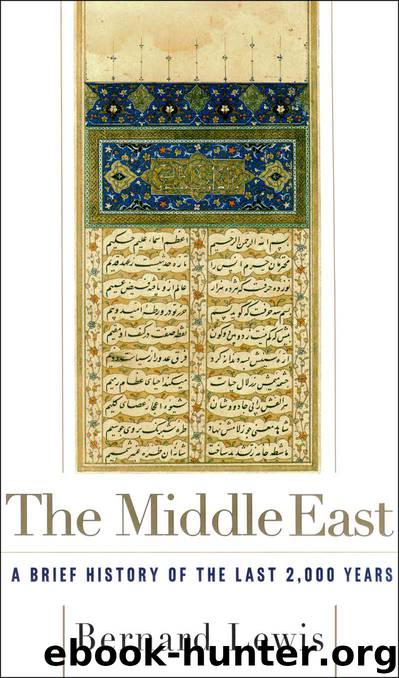The Middle East by Bernard Lewis

Author:Bernard Lewis [Lewis, Bernard]
Language: eng
Format: azw3
Publisher: Scribner
Published: 2009-12-09T05:00:00+00:00
It is a charge often levelled at historians that their enquiries are concerned only with the possessors of wealth, power and learning; that though they may pretend to write the history of nations, countries and eras, they are in fact writing only of a few thousand privileged persons, and disregarding the great mass of the people. This accusation is largely true. Yet the historians are not at fault. Unlike writers of fiction and other imaginative literature, the historian is limited by the evidence at his disposal. Until comparatively recently, and in some countries even until the present day, writing was the perquisite of those same possessors of power, wealth, and learning, or of persons employed by them. It is in consequence they, and for the most part they alone, who have left the books, the documents, the inscriptions, and other traces from which the historian seeks to reconstruct the record of the past.
But there are exceptions. In recent years, historians have sought, by laboriously piecing together odd scraps of information from here and there, to achieve some insight into the history and experience of the silent masses. For the Greco-Roman world, for Christian Europe, to some extent for the Ottoman Empire, the study of the history of the lower classes has made some progress. For the history of medieval Islam, however, the task has barely been begun. There has been some study of the city, and of various elements of the urban population, most of it concerned with economic rather than social history. A few brief articles here and there, a few chapters in books mostly devoted to other subjects, make up the sparse bibliography of scholarly literature devoted to the daily life of the common people of medieval Islam. From the late fifteenth century onwards, the vast resources of the Ottoman archives, both imperial and provincial, provide a surprising wealth of evidence on the everyday life of ordinary people in the cities and even in the villages. For medieval times the task is more difficult but not impossible. There are no archives comparable with those of the Ottoman Empire or of the European states, but documents have survived in significant numbers, most of them in Egypt. From these, supplemented and interpreted in the light of literary evidence of various kinds, it is possible to achieve some insight into the lives of the mma, the common people, as contrasted with the kha, the special people or the elites.
The picture that emerges is one of an extremely diverse and active urban population. The major components of this population were the artisans and craftsmen—masters, journeymen, apprentices, at varying economic levels. Many were organized in guilds, sometimes though by no means always ethnically or religiously homogeneous, and sometimes even occupying their own separate quarter of the city. The political, military and religious establishments as such formed part of the kha, but all three had their lower-ranking, worse-paid elements, who by their standard and manner of life belonged with the masses rather than with the elite.
Download
This site does not store any files on its server. We only index and link to content provided by other sites. Please contact the content providers to delete copyright contents if any and email us, we'll remove relevant links or contents immediately.
| Africa | Americas |
| Arctic & Antarctica | Asia |
| Australia & Oceania | Europe |
| Middle East | Russia |
| United States | World |
| Ancient Civilizations | Military |
| Historical Study & Educational Resources |
Empire of the Sikhs by Patwant Singh(23086)
The Wind in My Hair by Masih Alinejad(5095)
Rise and Kill First by Ronen Bergman(4790)
The Templars by Dan Jones(4689)
The Rape of Nanking by Iris Chang(4214)
12 Strong by Doug Stanton(3550)
Blood and Sand by Alex Von Tunzelmann(3205)
Babylon's Ark by Lawrence Anthony(2680)
The History of Jihad: From Muhammad to ISIS by Spencer Robert(2631)
No Room for Small Dreams by Shimon Peres(2368)
The Turkish Psychedelic Explosion by Daniel Spicer(2360)
Inside the Middle East by Avi Melamed(2357)
Gideon's Spies: The Secret History of the Mossad by Gordon Thomas(2354)
Arabs by Eugene Rogan(2301)
The First Muslim The Story of Muhammad by Lesley Hazleton(2275)
Come, Tell Me How You Live by Mallowan Agatha Christie(2261)
Bus on Jaffa Road by Mike Kelly(2160)
Kabul 1841-42: Battle Story by Edmund Yorke(2031)
1453 by Roger Crowley(2031)
